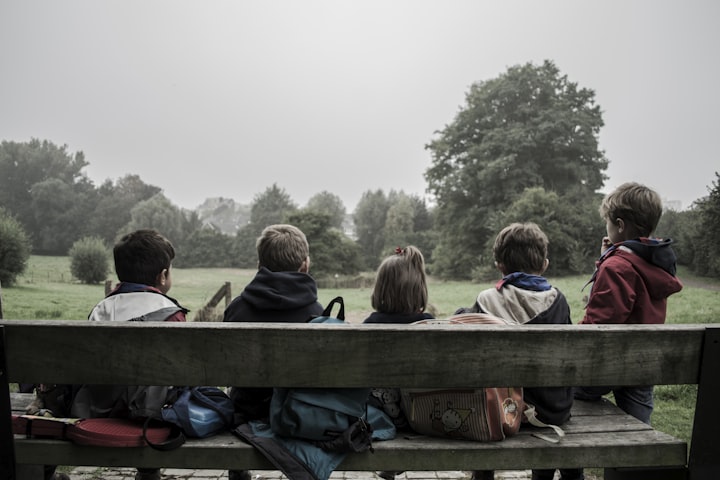How Can Parents Prevent their Children's Future Crimes?
Behaviours that predict potential violence in the child's personality and his willingness to crime

From harassment to theft, rape, violence, destruction and even murder, the crimes that society suffers from more than others vary greatly, and that laws may not completely succeed in deterring them, especially with the lack of full control of law enforcers over all areas in certain countries, whether for lack of capabilities or the spread of corruption . While no one in society escapes the impact of crimes even if they are not directly exposed to them, this raises the question of the role of parents in anticipating criminal behaviour in children and whether they can succeed in preventing it early or is it beyond their control and uncontrollable?
How predictable is criminal behaviour?
It is usually difficult to discuss the issue of criminal behaviour and the motives that lead to it, as this may usually point the finger at genetic factors, and that there are genes in a person responsible for being a criminal or not, and to what degree these genes can play a role, and the definition of The criminal behaviour itself varies from one society to another and even the punishment for it is not the same in all countries.
In the beginning, criminal behaviour can be defined as acts that represent a danger to oneself or society, and usually take place when there is an opportunity, a means and a motive. There may be a motive for theft but the opportunity never comes, or a person lacks the means and here he is not a criminal in the literal sense, and even if it appears on him Characteristics of the criminal, the role of society and education here is to tame and prevent the means and the opportunity.
Behaviours that predict potential violence in the child's personality and his willingness to crime
Parents react strongly to the behaviour of their children, while some see that lying, stealing, breaking toys and harming pets are normal matters, but others may punish the child severely and harshly, which increases the problem, while there are those who deal more wisely with the rejected behaviours. For the child, and among the most important signs that could warn of a petty criminal project in the home:
- Antisocial personality: If a cat steals food, it hides, and the young child similarly warns strongly when trying to commit incorrect behaviour, such as destroying a toy, hitting his brother or throwing an inappropriate word, and he usually feels that he did something wrong, whether before or after his acceptance of the act, but there Children whose parents find that they enjoy making mistakes that hurt others, such as destroying their sister's drawings, hitting the pet hard, constantly lying without justification, or taking pleasure in hurting others. All this if he is not disciplined immediately and in multiple ways, whether by direct punishment, or by accompanying the child and involving him in social and sports activities, and discharging his excess energy, then it is already capable of turning into criminal behaviour.
- Escorting dangerous people: The child may be calm or have a fairly normal behaviour, but he tends to accompany dangerous children who have been known to be violent and destructive and are attracted to them, and this is also a sign of danger. Parents at an early age should monitor the way their children choose friends and look for appropriate solutions with specialists To control this tendency.
- Antisocial values : Here it is more dangerous than the anti-social personality, as the child sees that his wrong actions are actually good or desirable things, and he laughs a lot when causing one of his peers to cry, and may sometimes even harm himself by using sharp machines or pulling Hair or nail biting, and here he does not see any problem in his wrong behaviour and does not feel guilty at all, but always justifies his actions.
- lack of restraint : Most children burst into tears suddenly and may throw themselves on the ground and hit in front of them strongly, but this behaviour must recede from the age of five or six. Here, psychological intervention and treatment are necessary to identify the causes of this extreme nervousness before it turns into a murder at a nervous time.
The role of the family in increasing the crime rate:
There are families where the probability of children of criminals increases, no matter how good their physical and social levels are, as upbringing plays a major role in increasing the rate of criminal behaviour, and here specialists and governments must put an end to this type of family, because talking with parents will not be useful because they will often be The direct cause, and among the most family manifestations that increase the likelihood of children's involvement in criminal behaviour:
- Absence of the father's role: The absence of the father’s role is one of the main reasons for children’s deviation and their tendency to crime. It is true that there are many who grow up without parents and do not pose a threat to society, but the common factor among a good proportion of criminals is the complete absence of the father’s role, especially from the age of 10-14 years. in the lives of children. Teens who have good relationships with parents are less likely to get into legal troubles, starting with smoking, then drugs, and sometimes theft, and possibly getting involved in something bigger.
- Maternal role dysfunction: The special emotional experience that a child gets with his mother at an early age increases his feelings of empathy and positivity with others, and Chuck Smith, a child development expert at Kansas State University, confirms that the mother, whether biological or stepmother, plays an important role in the development of the child's personality and determines his attitudes when he grows up And matures. If an emotional obstacle occurs in the early years of his life between him and his mother, this leads to permanent damage between the person and his ability to emotionally relate to others, the child will remain less able to trust others and emotionally distant from them throughout his life, and this in itself does not constitute a crime, but if If the opportunity, the means, and the motive are available, this person may turn into a criminal in one moment. There are many reasons that may lead to emotional separation between the child and his mother, such as the mother’s suffering from separation from the father, her parents’ or society’s lack of support for her, or the economic conditions that force her to work for long periods, then she comes exhausting and cannot respond to the child, but screams at him when less verb. Therefore, the mother’s full dedication to take care of her child during the first four years is not a luxury at all. The psychological pressure that she is exposed to with work and home duties, and taking care of the young one can simply increase the number of criminals in the world and this is the current reality.
- Quarrel between parents: A lot of evidence and studies show that a child who grows between two parents has better mental health, but not all families consisting of a father and mother are psychologically sound, as the constant conflict between parents has many bad psychological effects, as a famous study from Harvard University confirmed , that one third of the delinquent sons in the sample they studied, come from homes where the wife is abused. Rather, it was observed that the rate of delinquent behaviour was more in healthy families in which there is constant conflict compared to the cases where the separation of parents, whether with joint care or even with only one of the parties caring for the child and the absence of the other.
- The effect of separation on the delinquency rate of people : Separation in itself may be in the children’s interest instead of living in a permanent conflict, but the continuation of this conflict after the divorce increases the deterioration of the children’s mental health, so the conflict should never continue after the divorce and deprive the child of seeing his mother or father, but must The inauguration of laws emphasising the importance of joint care and the communication of the son with his parents at all times, even if they are separated.
- The influence of criminal parents: It is true that each person chooses his own path, but life between two parents who are criminals, or one or both of them have been imprisoned, of course increases the chances of the children to commit crime, and unfortunately, the homes for juveniles and orphans are deteriorating in almost all countries of the world, to produce themselves a more criminal generation Oftentimes from their parents.
- Quality parenting: The conflict between the parents can turn into blaming the child for the inability to separate, or the child came without prior planning, or is persecuted because the parents wanted a male and a female came, or vice versa, which increases the child’s feeling of rejection and high levels of distrust By himself and increasing his hatred of others, these rejecting parents are more dangerous than previous models, as they not only fail to evaluate the behaviour of their children, monitor them and guide them, but provide several models of aggressive behaviour that falls on the child and imitates them when he grows up.
How can parents control the criminal behaviour of their children?
In the event that an ordinary family consists of a father and a mother, whether they are together or separated, with joint care for the children, and they find some unacceptable behaviours in the children, they have a direct role in controlling it. The most important features of this role are:
- Discussing with the child gradually thorny issues such as sex, drugs, alcohol, crime and their punishment, the child should not be punished when asked about any thorny topic, but open dialogue and communication is one of the most important ways to control delinquent behaviour.
- Constant alertness and notice any change: Adolescents are exposed to many changes in personality, and parents should be constantly alert to the features of danger and not focus on superficial matters such as the haircut or the shape of clothes, the teenager must be given greater freedom while observing his actual behaviour from afar.
- Children should not be left unattended and should not be left for long periods with servants after school or on summer vacation, as this increases the risk of their involvement in violent activities.
- Encouraging a variety of activities and hobbies. This not only leads to continued supervision of the child and releases his excess energy, but also increases his sense of motivation, participation, and acceptance of himself and others, which suppresses any early signs of criminal behaviour.
The school's role in preventing criminal behaviour
The school plays an undoubted role in preventing and even predicting criminal behaviour. By monitoring students’ reactions in the classroom to the meaning of their drawings and how cooperative they are with their peers, supervisors can quickly and professionally intervene to tame bad behaviour.
But what may happen at times is that a strict non-educational punishment is applied to the annoying child without trying to discipline him well, or on the contrary, the aggressive behaviour of the child is ignored, whether for fear of his family or for not being interested in education with education in school, and one of the most important roles that can be played The school may carry out the following in assessing criminal behaviour:
- Focus on group activities, whether in academic research or sports and hobbies.
- Using technology to identify troubled students through CCTV, establish strict rules, and even reveal isolated children and identify the causes of their personality disorder, even if there are no signs of violence yet.
- Appointing more psychological and social supervisors, as a result of the permanent budget cuts, a large number of schools ignore the job of the psychological and social supervisor or are satisfied with one person, and this is very harmful, as their role is no less important than the basic subjects and increase academic achievement not only for troubled children but for the rest of the students as well. Disruptive behaviour in the classroom distracts the mind and harms everyone as well as future consequences for society.
About the Creator
Judith Isidore
I'm happy to share my stories with Vocal media community.






Comments
Judith Isidore is not accepting comments at the moment
Want to show your support? Send them a one-off tip.